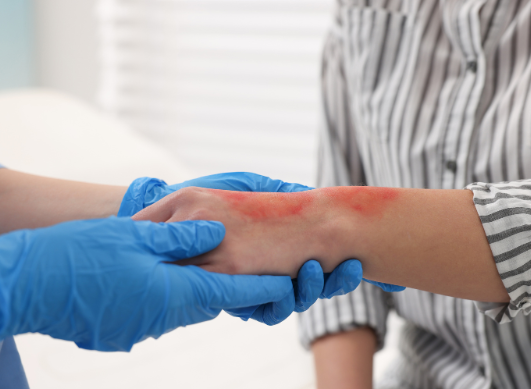- Home
- Forums
- General forums
- Good to know
- 10 Causes of Hair Loss and Baldness
10 Causes of Hair Loss and Baldness
- 116 views
- 0 support
- 1 comment
All comments

Rosha43
![]()
Rosha43
Last activity on 13/08/2016 at 12:18
Joined in 2016
12 comments posted | 3 in the Good to know group
Rewards
-
Contributor
-
Explorer
-
Friend
-
Newsfeeder
Great article.Here are my findings.
Hair loss can be a disease in itself, but it can also be a secondary effect of other illnesses. This is why it is important to see your doctor before attempting any pills, lotions or even natural remedies. If there's a hidden cause for your hair loss, you need to treat it above all. Hair loss will cease once the original cause is removed.
Diabetes, anaemia and other nutritional disorders may result in hair follicles becoming weak, thus leading to a loss of hair in much bigger amounts than usual. Topical treatments won't work in such cases as long as the original disease remains untreated or isn't stabilized in a way or another.
Vitamin deficiencies might also cause the hair to look sick and eventually to fall down. For instance, a lack of vitamin C will result in a very dry, brittle hair that splits and looks unhealthy. That's because vitamin C is an antioxidant. Its presence in the body is needed because it helps to neutralize free radicals, the hidden enemies that cause premature ageing among other affections.
Vitamin E is also very important for your hair growth. It enhances the blood flow, thus helping feed hair follicles in your scalp and make them produce hairs at an accelerated rate.
It seems vitamin D plays a role in the health of the hair. Scientists assume this because they discovered the hair follicle is rich in vitamin D receptors. Studies are currently ongoing, but results are yet to be published. Anyway, vitamin D is so good for your body that it makes sense to supplement it, even if you aren't sure it will prevent or cure your hair loss.
Lupus is an autoimmune disease that may determine permanent hair loss. Being an inflammatory disease, it sometimes destroys the tissues. When scalp is affected, the result will be a loss of hair in patches. These patches are most prone to appear in the temples area. Unfortunately, they are permanent, so there isn't much to be done in this case.
Thyroid conditions often result in hair loss. Thyroid is responsible with regulating the metabolism. In case of malfunction, hair follicles might not receive all the nutrients they need for the proper development of hair strands.
Funny enough, there are cases when hair loss is caused by your hair styling. If you often wear a hair style that implies traction, like a pony tail, your hairs will be stressed and weakened and may fall. This is not something to worry much about. Just change your style and your hair will become healthy again.
Sometimes, hair loss can be caused by the medication you use to treat various diseases. For instance, medication used to treat cancer, depression or arthritis may cause a temporary loss of hair.
Hair coloring and bleaching are two other factors that may determine hair loss. If you eliminated all other causes and still your hair is brittle and falls in big amounts, consider switching to a natural coloring solution such as henna.
Url : https://hairlosstipsmw.blogspot.com/2017/12/possible-causes-of-hair-loss.html
Articles to discover...
Subscribe
You wish to be notified of new comments
Your subscription has been taken into account








Margarita_k
Good advisor
Margarita_k
Last activity on 07/10/2020 at 11:39
Joined in 2016
1,195 comments posted | 118 in the Good to know group
2 of their responses were helpful to members
Rewards
Good Advisor
Contributor
Messenger
Committed
Explorer
Evaluator
Hair loss — whether baldness or noticeably thinning hair — can occur for a number of different reasons. Sometimes hair loss is a side effect of a health problem that needs to be addressed and will remedy itself when the health problem is properly treated. When hair loss is due to a condition involving the hair itself, as in the case of alopecia, the hair loss can be permanent.
1. Hair Loss From Thyroid Problems
Either an underactive thyroid, a medical condition called hypothyroidism, or an overactive thyroid, or hyperthyroidism, can result in hair loss because each condition causes a hormonal imbalance. Hormones help to regulate nearly every function in the body, including hair growth. Getting the right treatment to control either of these thyroid conditions will get hormones under control, stop hair loss, and allow your hair to starting grow back.
2. Thinning Hair Following Pregnancy
Other hormonal imbalances can also lead to hair loss, especially the wildly fluctuating hormones that occur following pregnancy and childbirth. It takes time after pregnancy for hormone levels to return to normal, so it's not at all uncommon for post-partum moms to notice thinning hair or even patches of baldness. This often occurs about three months after baby’s arrival. Don't worry — as the rest of your body recovers, so will your hair follicles. The hair loss is only temporary — your hair will grow back.
3. Hair Loss Due to Medications
Hair loss is a side effect of a number of medications taken for common health problems. Blood-thinning medications, oral contraceptives, drugs for depression, NSAIDs, and beta and calcium channel blockers can all lead to thinning hair or baldness. Too much vitamin A and vitamin A-based drugs called retinoids can cause hair loss as well. Some chemotherapy drugs used to treat cancer are known to cause total hair loss as they work to destroy cancer cells. Just as hair usually grows back after chemo, it should also grow back once you stop taking any medication that causes hair loss.
4. Different Types of Alopecia
Alopecia is the medical term for hair loss, and there are two main types: alopecia areata and androgenic (androgenetic) alopecia. Alopecia may cause hair loss only on the scalp or all over the body. It may result in thinning hair, patches of hair loss, some balding, or total baldness, and it may be permanent or temporary. There are numerous causes, including genetics. Talk to your doctor about possible treatments.
5. Physical Trauma: A Shock to Hair Follicles
When your body is under serious physical stress, the natural cycle of hair growth and resting can be disrupted, resulting in hair loss, often in the form of thinning hair — strands may come out in clumps. Any shock to the system, such as being in a severe accident, undergoing surgery, experiencing burns, or becoming very ill, can also shock the hair follicles, resulting in up to 75 percent of your hair falling out, sometimes months after the fact.
6. Emotional Stress and Your Hair
When you're dealing with a life-altering event, like a divorce or break-up, bankruptcy or other financial problems, the loss of a home, or the death of a loved one, significant emotional stress can also disrupt the normal cycle of hair growth. Significant emotional stressors can cause temporary hair loss, but once stress is brought under control, normal hair growth is usually restored.
7. Diet Deficiencies: Your Hair Is What You Eat
The essential vitamins and nutrients, like protein, that you get from a healthy, varied, and well-balanced diet ensure good health all throughout your body, making sure all your organs and internal systems are working just as they should. Poor nutrition or following a severely restrictive crash or fad diet can lead to all kinds of nutrient deficiencies, which in turn can result in hair loss, from thinning hair to patches of baldness.
8. Extreme Hair Care
In an effort to create a stylish hairdo, you can actually cause significant damage and breakage to strands, which could result in hair loss and thinning hair. Shampooing or blow-drying too frequently, repeatedly using heated styling tools, pulling on hair — whether from blow-drying it or styling it in a too-tight ponytail, for instance — or too vigorously rubbing the scalp can all lead to hair loss.
9. Infections That Cause Hair Loss
A number of infections and illnesses can lead to hair loss. An infection that causes a high fever, a fungal skin infection, and bacterial infections like syphilis can all be responsible for balding or thinning hair. Treating the underlying infection can restore hair growth and prevent future hair loss. So your first step is to seek medical attention for the primary health problem.
10. Autoimmune Diseases That Affect Hair
Alopecia areata is often associated with an autoimmune disease, so it's thought that some forms of hair loss can be caused by one of these medical conditions or is at least somehow related to it. Diabetes and lupus are two autoimmune diseases that can result in hair loss. This type of hair loss may not always be reversible — it may sometimes be permanent. But medications and hair restoration surgeries may help compensate for any hair loss.
Source: everydayhealth.com